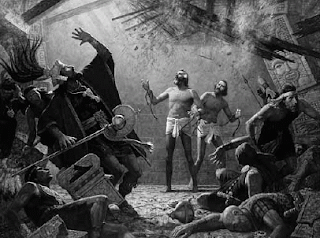Haiti has been on my mind. I have been reading the news about all the needed help being sent to the Haitians in their time of tragedy after the devastating earthquake on 1/12/10. There is a great need for food, medical equipment and doctors. Hundreds of thousands of people have lost their homes and loved ones. Our lesson today brought this tragedy to mind.
Today I asked my class these questions, "What could be the Lord's purposes in allowing this to happen?" "What good have we seen, or could we possibly see, come out of this tragedy?"
A few things we discussed: The Lord humbles us through trials like these. When we are humbled our hearts are opened/softened, and we are more receptive to the Spirit. True service brings more love into the world. Through Humanitarian Services, the LDS Church collaborates with other organizations to provide "temporal" relief. Perhaps this may some day open the door for missionaries to assist with "spiritual relief". Those blessed with an abundance of temporal wealth have an opportunity to open their hearts and share that wealth with those who are in need of it, thus giving up some worldliness. Nations are working together in service.
In Alma 14, Alma and Amulek are forced to witness innocent women and children being destroyed by fire. These are people who believed on their words and are being killed because of their belief. Alma and Amulek are helpless to save them, except for the priesthood power of God which they hold. Describing Amulek's reaction in Alma 14:10, "And when Amulek saw the pains of the women and children who were consuming in the fire, he also was pained; and he said unto Alma: How can we witness this awful scene? Therefore let us stretch forth our hands, and exercise the power of God which is in us, and save them from the flames."
Unlike the people in Haiti, this tragedy was inflicted upon the believers of Ammonihah by wicked unbelivers. But similarly, there are innocent victims in pain. Through the Spirit, Alma is able to give Amulek a response in verse 11:
"The Spirit constraineth me that I must not stretch forth mine hand; for behold the Lord receiveth them up unto himself, in glory" Those responsible for this crime will be held accountable, but those innocent believers were promised exaltation.
President Spencer W. Kimball has stated: “We find many people critical when a righteous person is killed, a young father or mother is taken from a family, or when violent deaths occur. Some become bitter when oft-repeated prayers seem unanswered. Some lose faith and turn sour when solemn administrations by holy men seem to be ignored. ... But if all the sick were healed, if all the righteous were protected and the wicked destroyed, the whole program of the Father would be annulled and the basic principle of the gospel, free agency, would be ended.... Should all prayers be immediately answered according to our selfish desires and our limited understanding, then there would be little or no suffering, sorrow, disappointment, or even death; and if these were not, there would also be an absence of joy, success, resurrection, eternal life, and godhood."
Sometimes we don't see or understand the "big picture". Accounts in the scriptures like this one helps us understand that a loving, just, merciful God is in charge, and that brings me peace in my heart.
(Humanitarian Services Emergency Response donations.)


































